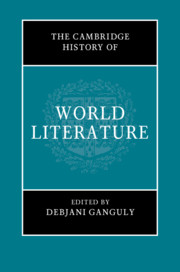Book contents
- The Cambridge History of World Literature
- The Cambridge History of World Literature
- Copyright page
- Contents
- Figures
- Contributors
- Acknowledgements
- Introduction
- Part I Genealogies
- Part II Thinking the World
- Part III Transregional Worlding
- Part IV Cartographic Shifts
- 22 The Multilingual Local: Worlding Literature in India
- 23 Oceanic Comparativism and World Literature
- 24 Mediterranean Worlds in the Long Nineteenth Century
- 25 Antipodal Turns: Antipodean Americas and the Hemispheric Shift
- 26 The Region as an In-between Space: Tomas Tranströmer’s Östersjöar and the Making of an Archipelagic Nordic Literature
- Part V World Literature and Translation
- Part VI Poetics, Genre, Intermediality
- Part VII Scales, Polysystems, Canons
- Part VIII Modes of Reading and Circulation
- Part IX The Worldly and the Planetary
- Index
- References
25 - Antipodal Turns: Antipodean Americas and the Hemispheric Shift
from Part IV - Cartographic Shifts
Published online by Cambridge University Press: 17 August 2021
- The Cambridge History of World Literature
- The Cambridge History of World Literature
- Copyright page
- Contents
- Figures
- Contributors
- Acknowledgements
- Introduction
- Part I Genealogies
- Part II Thinking the World
- Part III Transregional Worlding
- Part IV Cartographic Shifts
- 22 The Multilingual Local: Worlding Literature in India
- 23 Oceanic Comparativism and World Literature
- 24 Mediterranean Worlds in the Long Nineteenth Century
- 25 Antipodal Turns: Antipodean Americas and the Hemispheric Shift
- 26 The Region as an In-between Space: Tomas Tranströmer’s Östersjöar and the Making of an Archipelagic Nordic Literature
- Part V World Literature and Translation
- Part VI Poetics, Genre, Intermediality
- Part VII Scales, Polysystems, Canons
- Part VIII Modes of Reading and Circulation
- Part IX The Worldly and the Planetary
- Index
- References
Summary
This essay describes how the antipodal turn has impacted upon World Literature in both its geographic and figurative dimensions. It examines the history of the term antipodean in relation to a rhetoric of transposition and also considers it in the context of ecological and Indigenous criticism, as well as the new prominence of the Global South. The essay addresses the specific relevance of Australian culture to this formation, and it concludes by suggesting ways in which this antipodal turn might constitute a productive critical method.
- Type
- Chapter
- Information
- The Cambridge History of World Literature , pp. 477 - 494Publisher: Cambridge University PressPrint publication year: 2021
References
- 1
- Cited by

